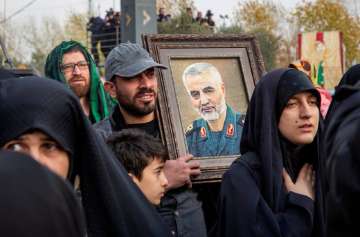While the US President Donald Trump and Secretary of State Mike Pompeo lobby governments in the region against Iran, India finds itself walking a tight diplomatic rope balancing the expectations of both America and Tehran.
On Saturday, Trump further raised the stakes by alleging that Major General Qasem Soleimani had been involved in carrying out terrorist acts as far as New Delhi, an apparent reference to an incident in 2012 involving an Israeli diplomatic vehicle being attacked near Chanakyapuri, New Delhi’s diplomatic enclave.
Trump’s statement hasn’t gone down well with defence experts and former diplomats, who point out that it directly defies the call for restraint issued by the Ministry of External Affairs (MEA).
“Peace, stability and security in this region is of utmost importance to India,” the MEA had said in a statement on Friday, adding that it was vital that the situation does not escalate further. “India has consistently advocated restraint and continues to do so,” said the statement.
Meanwhile, America’s Secretary of State Mike Pompeo has been speaking to regional leaders as he tries to muster support for his government, which since the strike taking out Soleimani has been accused of carrying out another air strike in Iraq’s Camp Taji, killing six people.
The Pentagon also informed through a statement that an additional 3,000 troops from US’ Immediate Response Force (IRF) of the 82nd Airborne Division were being deployed in Kuwait to deal with any fallout. The troops joined 650 American soldiers already deployed in the Middle-East region.
Peace in the Persian Gulf crucial for India's economy
“India is heavily invested in the Persian Gulf region and any disturbance there will have a direct impact on our economy. We need the Persian Gulf to be stable to be able to keep growing at six to seven per cent annually,” says veteran defence expert Qamar Agha.
He notes with concern the spike in oil prices by four per cent in the wake of the Suleimani’s killing, adding that remittances from the Gulf region make up almost half of the total from overseas countries. According to World Bank data, India received $79 billion in remittances, topping the global list of countries receiving remittances from abroad.
Referring to India’s stand toward Iran amid America’s efforts to get India onboard, Agha notes that Soleimani had on several previous occasions taken stands that backed New Delhi. “Be it the negotiations on the Chabahar port or Islamabad’s case in the International Court of Justice (ICJ) against Kulbhushan Jadhav, he had been been a backer of India on issues of national interest,” adds Agha.
Amid America’s sanctions in Iran, foreign minister Dr S Jaishankar visited Tehran on December 23 to hold talks with his Iranian counterpart Javad Zarif. In what’s reflective of the significance India attached to ties with Iran, the visit came a week after his official tour to the US.
“The US must understand India’s concerns. We need to be in the good books of Iran to secure our energy lines as well as get a route to Central Asia and Afghanistan through the Chabahar port,” a former foreign secretary told India TV News.
Also watch: America is keen to protect ISIS so they killed Qasem Soleimani: Syrian Ambassador on US strike on Iran
Latest India News
